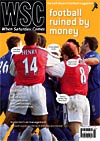 In Genk, the former mining town in Limburg, the team most likely to challenge Anderlecht is making waves again, as John Chapman reports
In Genk, the former mining town in Limburg, the team most likely to challenge Anderlecht is making waves again, as John Chapman reports
Nestling in the centre of the Brussels-Liège-Eindhoven triangle, Genk was once home to a thriving mining community. No more. With the closure of the first pit in 1966, the Ford motor company moved in and now dominates the town. But the legacy of coal lingers on. In the Fifties, thousands of Italians came to Belgium to work in the mines – including Enzo Scifo’s dad. In multicultural Genk, the Belgo-Italians are now the predominant immigrant population and their presence at home games helps fan the atmosphere. Indeed, so many flares were being lit during games that spectacular firework displays are now arranged for before and – something of a hostage to fortune this – after every home match.
Created in 1988 as the last mine closed, from the union of Thor Waterschei and Winterslag, Racing Genk’s birth was complicated, as there was intense rivalry between the two mining communities. Waterschei initially dominated the relationship as they had the larger fan base and Winterslag’s followers couldn’t bear to watch Genk at their rival’s stadium. Before the merger, both clubs played in Europe with Waterschei making it to the semi-final of the 1982-83 Cup-Winners Cup before losing to Aberdeen.
Leo Clijsters was a leading light of that Waterschei side, probably dreaming of his daughter Kim one day winning a Grand Slam tennis tournament while he swept up at the back of the Waterschei defence. Winterslag also had their time in the sun, defeating Arsenal in the second round of the 1981-82 UEFA Cup on away goals.
The merged club made little impact at first, but stability came in the form of Jos Vaessen and Aimé Anthuenis. Vaessen, a local industrialist who was big in radiators, continually invested, first as a director and then – after last season’s coup – as president. In October 1995, Anthuenis was appointed coach. At 54, having achieved little in the game, his time had come.
By 1999, Genk had won promotion, the Belgian Cup and the league title. With goals from Branco “Super” Strupar, now of the Derby County treatment room, and Guinea international Souleymane Oulare, currently at Stoke City but also injured, Genk were not attractive to watch but they were hard to beat – in the image of Anthuenis himself. Genk ploughed Vaessen’s money and cash from the sale of players into improved facilities, a theme cafe and a slick merchandising operation. Their medical facilities and fitness rooms are now the envy of all, including Anderlecht – the only club in Belgium with more support.
Genk’s mistake, when Anthuenis moved to Anderlecht, was to hand over the reins to a couple of losers. Ex-Waterschei player Jos Heyligen was too soft and was replaced by the former Anderlecht boss Johan Boskamp. The Dutchman demolished the side, bringing in young players and signing a few cheap ones. When his mix didn’t work, he gave his team a few high-decibel tongue-lashings. As talented Ivory Coast international Didier Zokora put it: “Boskamp never stopped shouting and we were paralysed. No one dared show any initiative and the young players just gave up.”
Boskamp lasted 18 months. By that time, only two players remained of the title-winning side. Enter another Dutchman, Sef Vergoossen, who had just left Roda JC as they “lacked ambition”. Vergoossen was the calm after Boskamp’s storm. Trusting his homely motto – “You don’t go to the shops without first checking the larder” – he transformed the club despite bringing in just one significant newcomer, Burkina Faso striker Moumouni Dagano from Germinal Beerschot. The new coach also brought discipline, arranging lessons for how the team should handle the press and the public – stripping off and vomiting in public were out. And it has worked spectacularly, up to a point.
Wesley Sonck, the discovery of the season, probably missed Vergoossen’s talks on discipline as he has a habit of kicking the advertising hoardings after scoring, is not afraid to berate team-mates and has announced on TV that he’s keen on porn films. But when your star striker is Europe’s top scorer with 21 goals in 19 games, he can be forgiven a few misdemeanours. Sonck is being watched by a host of Premiership clubs.
With “ABAs” (Anyone But Anderlecht) rife, Genk would be popular champions. Unfortunately, history has a habit of repeating itself in Belgian football and no one would be surprised if a second Genk title was followed by Mr Vergoossen heading for Brussels to check out Anthuenis’s accommodation.
From WSC 181 March 2002. What was happening this month